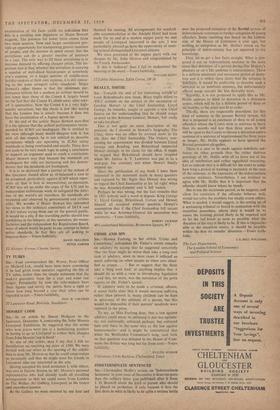INDETERMINATE SENTENCES
SIR,—Christopher Hollis's article on 'Indeterminate Sentences' in your issue of November 6 deserves more than the solitary letter you published after it from J. D. Benwell about the kind of person who should be placed on probation, if only because it fires the first shots in what is likely to be quite a serious battle,
over the proposed extension of the Borstal system of indeterminate sentences to further categories of young offenders. Some rumbling was heard on the Labour side of the House of Commons a year ago, but nothing so outspoken as Mr. Hollis's attack on the principle of indeterminacy has yet appeared to my knowledge.
First, let us get a few facts straight. What is pro- posed is not an indeterminate sentence in the same sense that detention of a person during Her Majesty's pleasure or on a life sentence is indeterminate. There is a definite minimum and maximum period of deten- tion and it is within these limits that the sentence is 'itideffiiite. It would be preferable to describe such a ''seritene& as an indefinite sentence, but unfortunately official usage accepts the less desirable term.
"Secondly, it is not proposed to apply this as Mr. Hollis appears to think to detention in a detention centre, which will be for a definite period of three or six months, as the court sees fit to order.
Thirdly, there are respectable precedents for this kind of sentence in the present Borstal system. All that is proposed is an extension of these to all young offenders whom the Courts wish to sentence to more than six months and less than three years. It will still be open to the Courts to choose a detention-centre sentence or a sentence of imprisonment for three years or longer. Mr. Hollis appears to have ignored the Borstal precedent altogether.
There is a case to be made against indefinite sen- tences on other grounds than the rather dubious penology of Mr. Hollis, with all its loose use of the idea of retribution and rather stiperficial reasoning. Let us concede that it is difficult for the court to judge how long a period of training is necessary at the time of the sentence, as the exponents of the indeterminate sentence maintain. Nevertheless, I am inclined to agree with Mr. Hollis that it is important that the offender should know where he stands.
But to use the maximum period, as he suggests, and allow for remission if the offender behaves well, would not solve the problem but simply create others. What is needed. I would suggest, is the setting up of a sentencing tribunal or board in connection with the reception procedure, whose duty it would be to assess the training period likely to be required and to let the lad know as soon as possible what the duration of his stay is likely to be. If this is impractic- able at the reception centre, it should be possible within the first six months' detention.—Yours faith- fully,
J. E. HALL WILLIAMS
The Law Department, The London School of Economics and Political Science


























 Previous page
Previous page